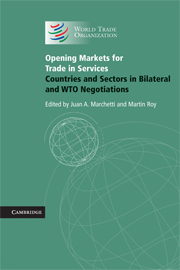Book contents
- Frontmatter
- Contents
- List of figures
- List of tables
- List of boxes
- List of contributors
- Foreword
- Acknowledgments
- Disclaimer
- Summary and overview
- PART I From Policy to Negotiations
- PART II Multilateral and Bilateral Negotiations on Services: Overall Perspectives
- PART III Challenges, Issues and Opportunities in Services Sectors
- 4 Telecommunications: can trade agreements keep up with technology?
- 5 The liberalization of cross-border trade in services: a developing country perspective
- 6 Out of stock or just in time? Doha and the liberalization of distribution services
- 7 Air transport liberalization: a world apart
- 8 Financial services liberalization in the WTO and PTAs
- 9 Beyond the main screen: audiovisual services in PTAs
- 10 The liberalization of postal and courier services: ready for delivery?
- 11 The liberalization of energy services: are PTAs more energetic than the GATS?
- 12 Market access for the government procurement of services: comparing recent PTAs with WTO achievements
- 13 A warmer welcome? Access for natural persons under PTAs
- PART IV Country Experiences with Services Trade
- Index
- References
5 - The liberalization of cross-border trade in services: a developing country perspective
Published online by Cambridge University Press: 05 December 2011
- Frontmatter
- Contents
- List of figures
- List of tables
- List of boxes
- List of contributors
- Foreword
- Acknowledgments
- Disclaimer
- Summary and overview
- PART I From Policy to Negotiations
- PART II Multilateral and Bilateral Negotiations on Services: Overall Perspectives
- PART III Challenges, Issues and Opportunities in Services Sectors
- 4 Telecommunications: can trade agreements keep up with technology?
- 5 The liberalization of cross-border trade in services: a developing country perspective
- 6 Out of stock or just in time? Doha and the liberalization of distribution services
- 7 Air transport liberalization: a world apart
- 8 Financial services liberalization in the WTO and PTAs
- 9 Beyond the main screen: audiovisual services in PTAs
- 10 The liberalization of postal and courier services: ready for delivery?
- 11 The liberalization of energy services: are PTAs more energetic than the GATS?
- 12 Market access for the government procurement of services: comparing recent PTAs with WTO achievements
- 13 A warmer welcome? Access for natural persons under PTAs
- PART IV Country Experiences with Services Trade
- Index
- References
Summary
One of the notable trends in recent years has been the increasing importance of the cross-border supply of services. This is occurring in a large number of services sectors, both through the partial substitution of services earlier supplied by the commercial presence of foreign companies or by moving natural persons, and through trade in newer services such as telemedicine and research and development. The other dynamic trend is the growth in offshoring, with developing countries as important participants. These trends provide huge scope for developing countries to exploit their comparative advantages in labor-intensive services without displacing substantial labor in developed economies, at the same time adding to efficiency gains and cost reductions in the latter. The further opening of markets for cross-border services, by providing the necessary boost to the global growth engine, could become a win-win situation for all.
Current policy with regard to the cross-border supply of services, both in developed and developing nations, seems to be more liberal than reflected in current GATS commitments or offers submitted in the Doha Round. The liberalization of the cross-border supply of services has featured prominently not only in current WTO negotiations, but also in recent preferential trade agreements between various countries. The trend in many of these bilateral negotiations appears to be toward the binding of the actual status quo. The PTA context seems unsuitable for establishing the grounds of a truly open global environment for the supply of services on a cross-border basis, however.
- Type
- Chapter
- Information
- Opening Markets for Trade in ServicesCountries and Sectors in Bilateral and WTO Negotiations, pp. 184 - 223Publisher: Cambridge University PressPrint publication year: 2009
References
- 1
- Cited by



